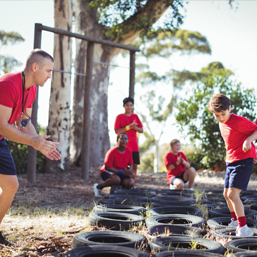
Everyone knows the basics of what you learn at your average summer camp - how to make a fire, pitch a tent and navigate the woods - but there are many other abilities that your kids pick up at camp which will help them in life for years to come.
“Camp is fantastic at building what I like to call ‘good human skills’ – being respectful, responsible and playing their part in a community,” says Callum Monteith, board chair of the Alberta Camping Association (ACA). “Camp is a community, and they learn to be responsible for themselves and those around them.”
Spending time in an environment without you, with people they wouldn’t have normally met elsewhere, and doing things they wouldn’t normally do creates the opportunity for your child to learn and grow like you could never imagine before sending them to camp.
Here are some of the great things that kids learn at camp:
1. Understanding others’ emotions. Empathy is one skill that may seem much more apparent in your child when they walk through the door after some time away at camp. Being exposed to many different people (and all the feelings and emotions that come up at camp) for a long period of time can teach your child how important it is to understand others’ emotions and help them implement tips and tricks for coping with them. This can translate into your child being more compassionate with their sibling(s) and they may even start to point out when you need to step back and take some deep breaths.
2. Appreciating differences. Exposure to people they wouldn’t normally meet is a huge part of the camp experience. Depending on the nature of the camp, kids can spend a significant amount of time with people of different backgrounds, abilities, nationalities, religions, and socioeconomic situations than they are usually exposed to. This is hugely beneficial in that it helps to teach kids empathy and understanding as they learn that other people’s home lives aren’t exactly the same as theirs.
3. How to live in the moment. It is amazing how much time outdoors and away from a screen can teach children to pay attention to the here and now.
“There is no pressure, no expectation, no homework, no extracurriculars,” says Callum. “You are really able to live in the moment and enjoy your time doing whatever you are doing with whoever you are with at that time.”
Without worrying about getting the best video to post to their social media accounts or wondering what their friends are going to think about what they’re doing, kids can fully immerse themselves in the experience.
4. A sense of belonging. Camp can help your children make new friends and start to figure out who their people are. Just like school, children will naturally split up into groups in a camp setting and where your child fits in this system can help them partner up with others who like the same things and have similar skill levels. This can lead to a healthy level of competition, learning from each other and lifelong friendships.
5. Take risks and conquer fears. Although this is the most worrisome part of camp for parents, the fact that you are not there to watch their every move means that kids are able to take measured risks at camp. “The best thing about camp is that it allows children to experience the benefits of risk,” says Callum. “They are exposed to things they wouldn’t normally be exposed to and get to step out of their comfort zone on so many levels – physically, socially and emotionally to become well-rounded individuals.”
This lets them see that they are capable of conquering things that would have scared them before. Getting out of their comfort zone is an essential part of growing up, and they learn that being uncomfortable isn’t always bad.
6. An appreciation for their parents. This might be your favorite reason on the list. Although they will undoubtedly have the time of their life at camp, there will also be many things that they miss about home – the most prominent being their parents and siblings. Being away from home gives kids a chance to realize what they have and appreciate it. Once they get home, you may find them helping more around the house (with the new self and home care skills they have learned), being kinder to their siblings and being more willing to say please and thank you – is there any bigger benefit than that?
See our related articles:
Calgary’s Child Magazine © 2024 Calgary’s Child